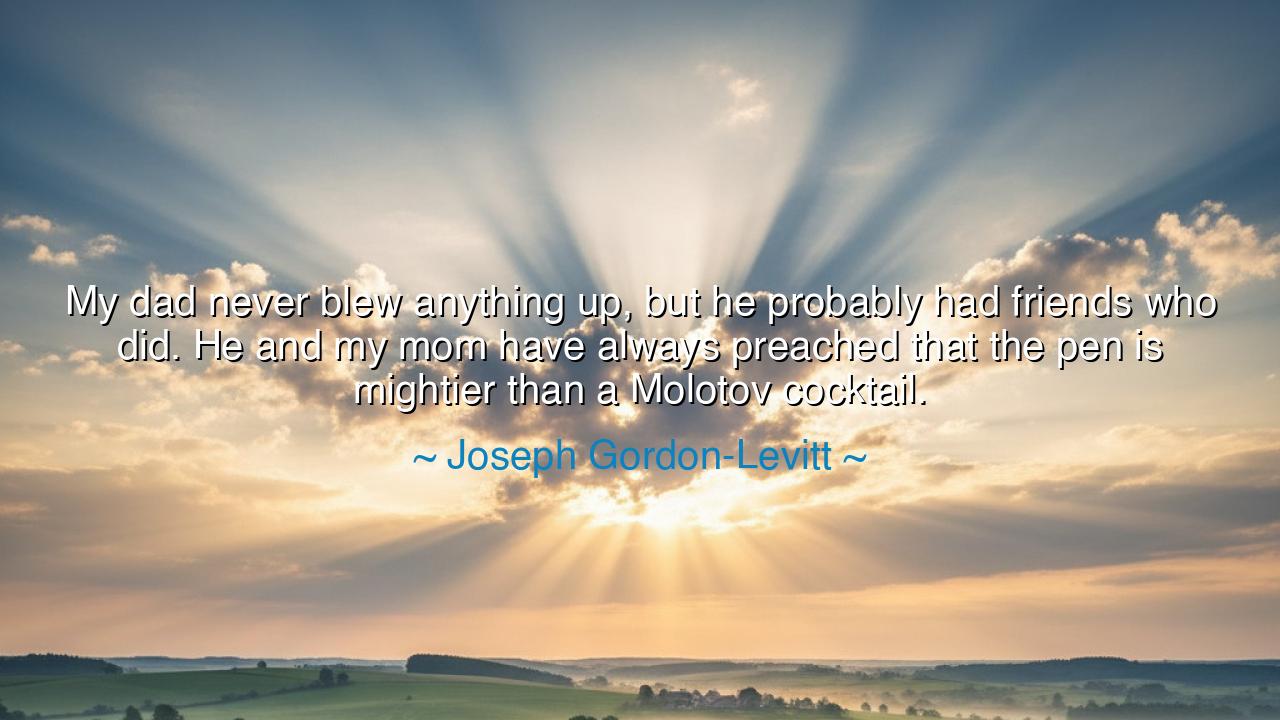
My dad never blew anything up, but he probably had friends who
My dad never blew anything up, but he probably had friends who did. He and my mom have always preached that the pen is mightier than a Molotov cocktail.






“My dad never blew anything up, but he probably had friends who did. He and my mom have always preached that the pen is mightier than a Molotov cocktail.” — Joseph Gordon-Levitt
In these words, Joseph Gordon-Levitt speaks of a lesson passed down not through books or doctrine, but through the quiet moral inheritance of family. His father, a man of conviction but not of violence, and his mother, a woman of conscience and thought, taught him an eternal truth — that ideas are more powerful than destruction, and that the pen is mightier than the Molotov cocktail. Beneath the humor of his phrasing lies the voice of wisdom echoing through the ages: true change is born not from chaos, but from creation; not from the fire that burns, but from the word that endures.
This saying, though wrapped in modern imagery, carries the same essence as the ancient proverb once coined by Edward Bulwer-Lytton in the nineteenth century, who declared that “the pen is mightier than the sword.” Gordon-Levitt’s father and mother simply carried that torch into a new era — one in which rebellion was no longer fought only on the battlefield, but also in the mind. To reject the Molotov cocktail, symbol of rage and destruction, is not to reject resistance, but to elevate it. It is to say that a thought well spoken, a truth well written, can shake empires more deeply than any explosion ever could.
Consider the lessons of history. Mahatma Gandhi faced an empire armed with guns, yet he wielded only the power of nonviolence and conviction. His pen — the letters he wrote, the words he spoke — set millions in motion and undid the chains of colonization. Martin Luther King Jr., too, fought not with bombs but with speeches, sermons, and dreams. His words, carved from the deep stone of faith, toppled walls that centuries of hatred had built. Even Nelson Mandela, imprisoned and silenced, proved that the mind cannot be caged — his writings from his cell became a weapon far sharper than any blade. Such is the power that Gordon-Levitt’s parents spoke of: the belief that ideas shape destiny, while violence only delays it.
And yet, this truth is not easy. To choose the pen over the Molotov is to choose patience over passion, reflection over rage. It is to believe that justice born of wisdom will last longer than justice seized by force. The young, especially in times of turmoil, are tempted to act, to destroy, to make their pain visible. But the elders — those who have seen the futility of destruction — teach otherwise. They remind us that every act of violence creates only another wound, while every act of creation plants a seed that will one day bloom. Fire burns quickly; words burn eternally.
There is also in this saying a deep faith in dialogue — the belief that even when we disagree, the exchange of ideas is the true path forward. The Molotov speaks only once; it ends the conversation. But the pen invites response, reflection, and reason. It calls upon humanity’s higher nature, the part that listens and seeks understanding. In a world still too often divided by anger, Gordon-Levitt’s father and mother stand as examples of a nobler kind of revolution — one that changes minds instead of destroying lives.
Think also of the great writers who became warriors of truth: Voltaire, whose words struck at tyranny; Harriet Beecher Stowe, whose novel stirred the conscience of a nation; Alexander Solzhenitsyn, whose pen exposed the horrors of oppression in the Soviet Union. None of them lit fires in the streets, yet each of them changed history. They remind us that courage does not always roar — sometimes it writes. And though their battles were fought without weapons, their victories were absolute.
So, O listener, take this teaching to heart: choose creation over destruction, expression over explosion. When the world enrages you, do not add to its noise — write, speak, reason, build. The flame of a Molotov may light the night for a moment, but the flame of truth, once written, can illuminate centuries. Let your anger become art, your passion become purpose, your words become weapons of light. For those who hold the pen with courage and conviction wield a power that no tyrant, no army, no flame can ever extinguish.






AAdministratorAdministrator
Welcome, honored guests. Please leave a comment, we will respond soon